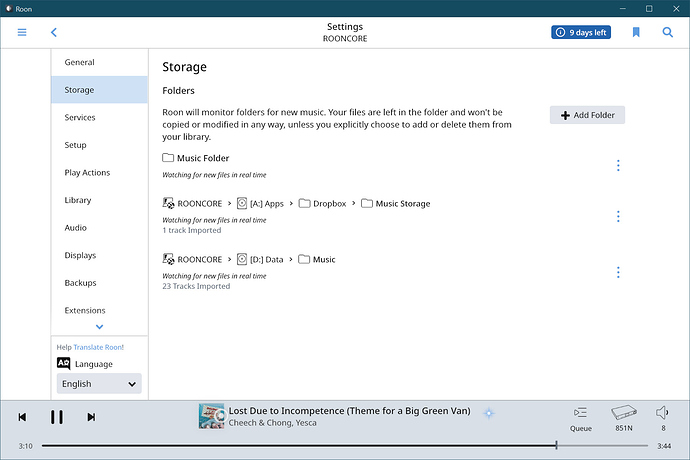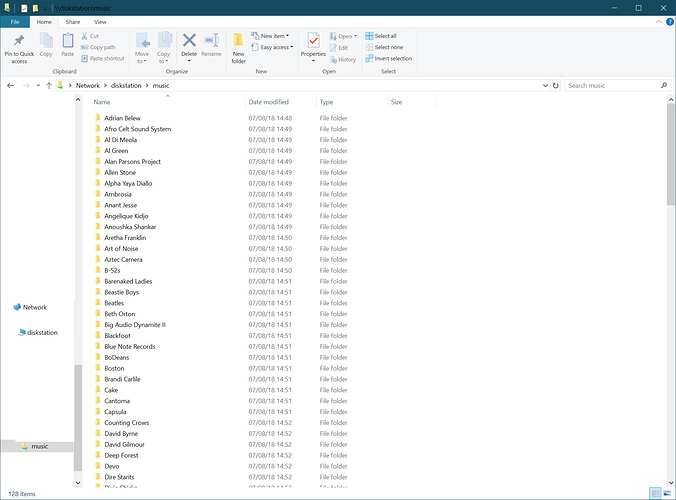Core Machine (Operating system/System info/Roon build number)
Windows 10 (1903), Intel Core i5 with 16GB RAM, MSI Mobo, Roon build 571
Network Details (Including networking gear model/manufacturer and if on WiFi/Ethernet)
Ubiquiti Edge Router connected to Ubiquiti and D-Link Gb switches, Wi-Fi is Ubiquiti/AmpliFi HD Gamer’s Edition (although all current connections are over Gb Ethernet)
Synology DS212j NAS with shared music file (added to Roon Folders and actively monitoring)
Dropbox folder (added to Roon and actively monitoring)
Tidal subscription (highest level / MQA) that is active in Roon
Audio Devices (Specify what device you’re using and its connection type - USB/HDMI/etc.)
MacBook Pro (Catalina) connected to Emotiva XDA-1 via USB
Windows 10 Pro (1903) PC connected to Focusrite Scarlett 18i8 via USB using ASIO
Cambridge Audio Azur 851N streamer/Roon endpoint
Gaggle of Sonos One speakers (in stereo pairs) and a Playbar/Sub/Ones “5.1” setup
Description Of Issue
Albums/tracks missing from library.
I have a Synology DS212j running the most current SynOS with “Music” folder/share and Dropbox installed on the Roon Core PC (Win 10 1903) that is seemingly not importing anything from either of those sources. I say seemingly because a lot of the albums that are on the NAS and/or in Dropbox which are also available through Tidal show up in my library but albums that are not available through Tidal do not show up at all. Most, if not all the missing tracks are now duplicated in both NAS and Dropbox (to see if I could get Roon to pick them up) but to no avail. It’s as if Roon is acting as a fancy Tidal interface and that’s all… Obviously, not optimal.
All of these tracks are in .MP3 format (for compatibility) and play on everything I throw them at natively. If I put the .WAV versions on the NAS or Dropbox, the same thing happens (or doesn’t happen.)
While I appreciate the feature of picking the highest quality version available to play, some of my library contains projects that I worked on (I’m a recording engineer/producer) that are either too new, too obscure or unlicensed to be published to Tidal. But of course that doesn’t mean I don’t want to see them. If there’s little to no metadata in the files, will that stop Roon from picking them up even though the file is compatible?
I should also mention that all connections seem in working order in Roon’s Setup and ‘Force Rescan’ does nothing to address the issue. ‘Skipped Files’ is an empty list.
Here’s a Dropbox link to an example that does not show up in the library at all because it exists only on the NAS and in Dropbox folder: https://www.dropbox.com/s/ftg7ehtp9jyn91x/02%20-%20Thanks%20For%20Asking%20(Don’t%20Ask%20Mix).mp3?dl=0
For edification, here’s a URL to the folder in Dropbox that contains the above file: https://www.dropbox.com/sh/z37noaolj1vc9ef/AAD1xj9gsj6Fzi24L81oApaua?dl=0
I picked this folder specifically because the spelling contains a special character that’s not listed in the support info as being invalid but I figured I’d send it to you to see if that’s an issue. That said, ALL folders that do not have companions in Tidal are indeed missing in Roon, regardless of spelling/etc.
Please help - what am I missing?
I’ve been through all the settings, done searches in the community and can find no reason for the lack of sync. between Roon and my local sources. I don’t really need Roon to be only a Tidal intermediary, I need Roon to do what Roon is known for…
Thanks in advance for any/all assistance!
Cheers,
C


